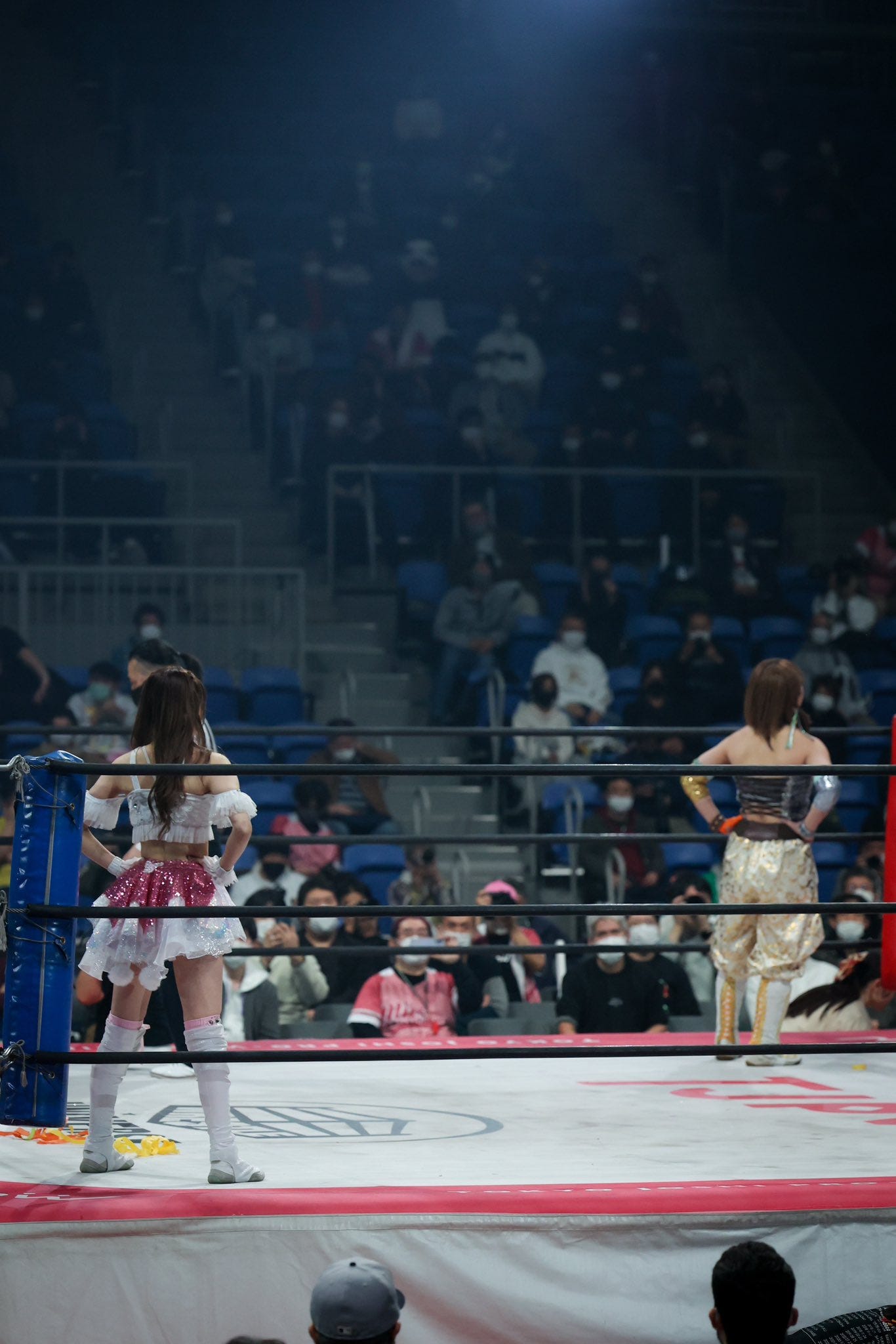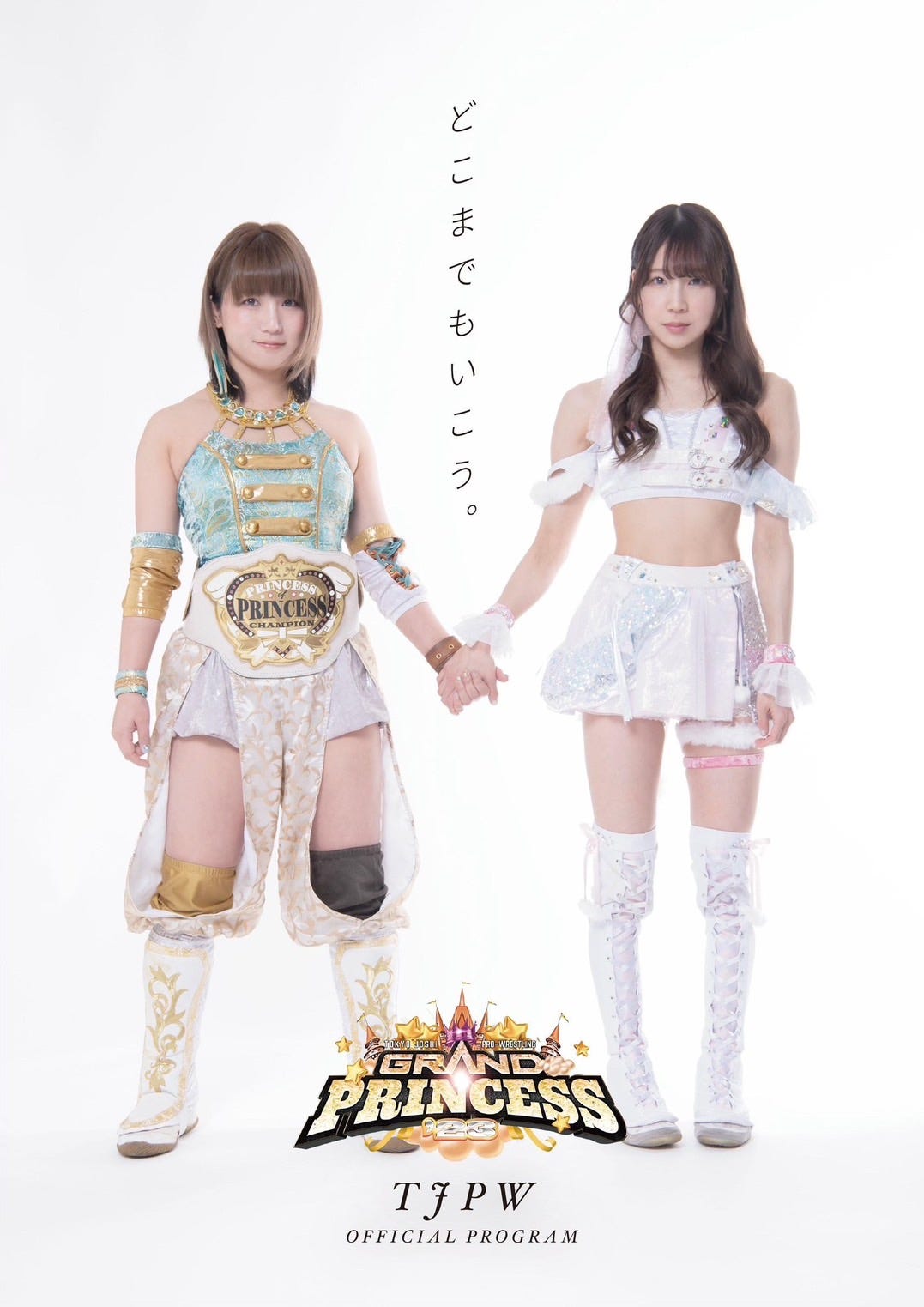Loved, Spoiled, Hated: On Yuka Sakazaki vs Mizuki
A queer reading of the Grand Princess '23 main event
Front Matter
The photographs used in this article are linked to the Twitter accounts responsible for them: simply click through to bring up the original post. If you are a photographer whose image I have used here, and you do not grant me permission to reproduce your work, please let me know (Twitter: @FlupkeDiFlupke) and I will remove it. Thanks!
写真家さん、ここにイメージが写すことが許可しなければ聞いて下さって私は大至急除きます (ツイターの @FlupkeDiFlupke です)。ありがとうございます!
Grand Princess week continues, with a vital interpretation of the main event as queer love story. Before digging into this piece, why not check out Stuart’s comprehensive review of the show, or read some of Flupke’s longer-form thoughts? And come back tomorrow, for an equally thorough treatment of the Suzume and Arisu Endo’s opening match masterpiece!
Subscribe now!
Subscribe to Marshmallow Bomb for free to receive all our posts direct to your inbox, or donate $5 a month to access the full archive. A portion of every subscription supports Amazon Frontlines, an organisation dedicated to working with Indigenous peoples to defend their way of life, the Amazon rainforest, and our climate future.
“I always want her to say, ‘I love Yuka-chi.’ “
'In the days since Yuka Sakazaki and Mizuki’s match for the Princess of Princess title at Grand Princess ‘23, I’ve seen a lot of people say many times that the theme of the show was matches “between friends.” I want to challenge that: the main event was not a match between friends, it was a match between wrestlers who are in love. The match was yet another step in a story that they have been telling for years, about how far a great love can take you, and when, perhaps, that same love holds you back.
One of the complexities of talking about pro-wrestling is that you both are, and are not, talking about actual people. Sometimes it can feel nearly impossible to tell where the person ends and the character begins. One of the things that makes TJPW so special is the extent to which the characters do not feel like characters at all—on any given day it seems like you are really seeing the wrestlers reacting to things, and going through story beats, as people. Maybe we are, and maybe we’re not, but they’re professional wrestlers, so the most likely thing is that we’ll never know one way or the the other.
I think that the context is part of what makes this conversation so difficult. It feels kind of weird, and kind of gross to “ship” real people like you would Bucky Barnes and the other guy, and it feels pretty inappropriate to speculate about real people’s sexualities. Fans have a much easier time talking about gay storylines when they’re obviously a storyline. Everyone knows that Ram is Raku’s husband and Ram cheated on Raku with other girls because they literally said it in the match, and it’s so bizarre and funny that we all know it is a bit. It’s harder to talk about it when the performance is nuanced, and heartfelt, and feels, well, like it could be real. I don’t want to be someone who ships real people, and I want to be really clear that I’m not talking about the people who are playing Mizuki and Yuka Sakazaki, who I know absolutely nothing about. When I say “Mizuki” or “Yuka” here I mean the characters.
But those characters… Well, they’re in love, aren’t they? And I think sometimes we don’t like to say it publicly because of all the reasons I said before, all of which are true, but the story is gay. TJPW is super gay. The sensibility of the entire promotion is g a y. There’s a sense of tragic longing that underlies most of their popular (and funny!) storylines, and that is a hallmark of gay art. I’m not a TJPW historian: I’ve only been watching since 2021 (pro-wrestling was my pandemic hobby) and other people have written a lot more about their tag team in years gone by, so I’m not going to cover that here. I think the most salient point I can make here is that the original Itoh Respect Army broke up because Mizuki wanted to be with someone who felt the same way (about their tag team) (of course.) Anyway, now she’s with Sakazaki, and of course they begin and end every big match holding hands and falling on each other sobbing. They speak at great length about how much they love each other. It’s pretty explicit, to me, a gay person. So when everyone says “they’re great friends.” I just want to say: no. I don’t think they are. I think that these characters are not friends, but that they are in love.
“I need to hate you, in order to beat you”
When I was putting together my first draft of this piece, Flupke asked me if I’d seen Yuka and Mizuki’s title match at Grand Princess 2020, and whether I thought that storyline had anything to add to my argument here. I hadn’t seen the match before (not a historian!) but as I watched the match I was struck by a few things. The story is not unrelated, but feels dramatically different, I think for one main reason: Mizuki and Sakazaki have grown as wrestlers and performers since 2020. It’s obvious, isn’t it? In the lead up to their first title match Mizuki spoke about how she needed to hate Yuka in order to beat her. Ahead of the 2023 match, Yuka said she didn’t want Mizuki to hate her. In the 2020 match Yuka hadn’t yet reached the level of violence she is now capable of, and could still beat Mizuki without it. In 2023, there’s no way she could step back to where she was in 2020 and still get the job done.
In their 2020 match, despite all the emotions in the build-up, Mizuki never seems afraid of laying into Yuka. Even though she covers her ears as Yuka’s music plays, neither hesitates in the opening grappling sequence, instead flying at each other, the force of their movements carrying each other around the ring. Both appear more comfortable with a certain degree of sadism in this match. Mizuki smiles with glee after she rolls through a bow and arrow to keep it applied, and performs a Cutie Special off the top rope. Sakazaki, for her part, displays less tenderness here, and certainly none of the reluctance we see in the later match. There are a few poignant parallels. Yuka holds out her hand to Mizuki after the Magical Merry-Go-Round to pull Mizuki up into a forearm strike exchange, and when, the match has been all but lost, Mizuki extends her arm to Yuka before Yuka lands the first of her two Magical Girl Splashes. But these moments of tenderness are secondary in the story of the match.
I think perhaps part of the reason why people feel much more comfortable calling their 2020 match a great match is because, technically, it is. The storyline doesn’t feel like the point here, whereas their match at Grand Princess feels like a vehicle for the story they are telling, and the story they are telling isn’t really about the belt, it’s about the difficulty of loving someone who needs something that you are afraid to give them.
“Because I love you I can’t lose”
In the lead up to their 2023 match, Sakazaki was in denial, refusing to do preview tags, and saying, repeatedly, that she didn’t want to do anything that would make Mizuki hate her. Both of them spent the press conferences crying over the prospect of the match. The cover of the program featured them holding hands saying “let’s go on a journey no matter how far it takes us.” The promo video for the match says “because I love you I can’t lose.” Mizuki, despite all of this, despite her love for Sakazki, has no real qualms about fighting her, because what Mizuki needs is to prove herself, not just to the TJPW audience, but to Yuka herself. Yuka doesn’t understand, and thinks that what Mizuki needs is to win the belt.
The lead up to this match reverses the usual challenger-as-protagonist structure, and the intrigue is instead all about the relationship between Sakazaki and Mizuki, specficially about how Sakazaki will respond to Mizuki insisting she needs something that Sakazaki does not feel comfortable giving her: Mizuki needs to face Sakazaki as a wrestler, not as someone whom Yuka loves. Mizuki argues that time and space become distorted inside the ring: just as Mizuki can acknowledge that the Yuka she knows outside the ring isn’t the same one that exists inside of it, so Yuka should be willing to see Mizuki in a different light for the duration of their match - a challenger, to be dispatched at any cost. In the end, Sakazaki couldn’t give Mizuki that honour, and Mizuki couldn’t give up on demanding it. Relationships have ended over less.
Yuka does not want to fight the love of her life. She starts off trying not to fight Mizuki (in his review Stuart mentioned that he found this element frustrating and melodramatic, and you bet it is, that’s the point!), teasing such classic heel behaviors as a body slam to the outside before instead setting Mizuki down on her feet and walking away, shaking her head sadly. When she can’t hold off getting the match underway any longer, Yuka goes straight to an illegal choke, trying to get the thing finished as quickly as possible.
This match was able to tell a story that the 2020 match didn’t tell because of how much Sakazaki and Mizuki have grown as actors. You can say it’s melodramatic, but if you watch K-dramas, J-dramas, or any good Jane Austen adaptation you can see the playbook they are pulling from here: anguished longing gazes, soft eyes that betray both love and hurt, the inevitable feeling of losing someone who you feel is your fate. The match in some cases parallelled their match from 2020, with the double foot stomp from the top turnbuckle to the floor making a repeat appearance, and a beautiful parallel of the elbow strike exchange, with Yuka this time not reaching for Mizuki, but instead cradling her face before laying into her with a strike. Yuka seems disappointed with herself for each move she does to Mizuki. The whole match is marked by Yuka’s hesitance, the way she drops to her knees, head hanging, after the second Magical Merry-Go-Round in the center of the ring. She could have won there. So why didn’t she?
Sakazaki knows that Mizuki really wants this victory. Mizuki really needs this, and it is in her power to give Mizuki, who she loves, what she needs, but in doing so she has to give up something that is important to her: the Princess of Princesses belt, and, possibly, her relationship with Mizuki, if the toll the match takes is too great. I don’t say she has to risk giving up something important to her: I feel that Sakazaki resisted the match because she was afraid of what the outcome had to be. Yuka was a champion, and had fought hard to take her place again at the top of TJPW. Throughout this match we see her wrestling (sorry) with herself: does she retain her crown as the champion, or does she give Mizuki the precious gift she so desires? Thinking that what Mizuki needs above all is the belt, Yuka gives it to her.
I think for me, the moment when the match was over is the moment when Mizuki clings to Yuka’s legs following the Magical Girl Splash, using Yuka’s strength to pull herself to her feet. Sakazaki cradles Mizuki’s face, and delivers a crushing elbow strike, strong enough to lay Mizuki flat, but after that Yuka fails to hit another move. There are almost three minutes left of the match after that elbow strike, three minutes in which Mizuki evades, Yuka resists, and then the second Cutie Special scores Mizuki the fall. In the end, Sakazaki makes the decision not to kick out of the Cutie Special, even though she could, because she feels that this is how she can best show her love to Mizuki. This decision will come back to haunt her, and it will hang like a cloud over Mizuki’s reign. To a not-small number of fans, it already is hanging over Mizuki’s reign.
“But just being spoiled all the time, that would be worse”
None of what happens makes any sense if this a story about a tag team, a story about friends. I think that misunderstanding accounts for the mixed reviews. Why did this match feel so different from Daydream’s match for the International Princess belt? Because Rika and Miu are a tag team, they aren’t in love. They are friends, a mentor and mentee, tag team partners, but they are not together. I can understand being frustrated by Sakazaki’s unwillingness to go all out, but this match wasn’t about physical moves, or athleticism, or finding cool new ways to get CTE: it was about testing what the limits of your love for another person are. It was about the moment when you know that maybe one of you needs something the other can’t offer, but you love each other enough to try to give it anyway, even when it hurts. It was about a moment in a relationship when you realize that one of you has a boundary that the other must cross. It was about offering the wrong thing, and making everything worse, when you’re just trying to make it better.
If you look at Sakazaki’s face at the end of the match, you see the way she smiles for as long as Mizuki looks at her, before returning to a look that is deeply wistful, a look that suggests a knowledge that something has changed even if she isn’t sure what it is yet. Mizuki ends the match wanting everything to stay the same. She wants Yuka to continue pampering her outside of the ring, and I don’t doubt that Yuka will, but eventually, I think Mizuki will accept what she already knows: Yuka, in trying to demonstrate her love for Mizuki, treated her as though she was less than she is. Yuka denied her the one thing she truly needed: to win on her own, without Yuka’s help.
They told us what the story of the match would be, back in the press conference before Grand Princess, and it was exactly what the match delivered. Yuka says “I don’t want to do it. The most important thing for me is that I don’t want Mizuki to hate me, and I always want her to say, ‘I love Yuka-chi.’ So I don’t want to fight her.” Mizuki, crying, replies “I don’t want to fight her, but just being spoiled all the time, that would be worse.” And now, look at what Yuka has done. She’s spoiled everything.
Of course it feels unsatisfying, as though Mizuki beat a Yuka who was holding back. She did. That was the story that was being told. I don’t think that it was a mistake that we feel this way. If we’re feeling like Mizuki was shortchanged, just imagine how Mizuki must feel. She has been, in a very deep way, betrayed by the person who she loves, and perhaps even worse, betrayed because Yuka loves her, but wouldn’t listen to what she needed. She said she needed to win this alone, and she had that opportunity denied to her, because Yuka insisted on thinking of Mizuki as someone she loves and not as a wrestler. Yuka thought that Mizuki needed a gift, when what she needed was to be treated as an equal. This storyline doesn’t do a disservice to Mizuki. Rather, it places her at the center of one of the most moving and emotionally real stories being told in wrestling, but only, I think, if we let ourselves admit that it is about people who are in love.








